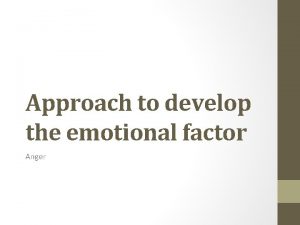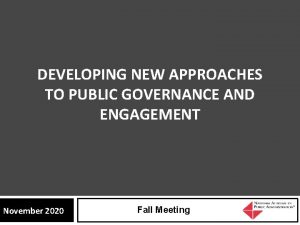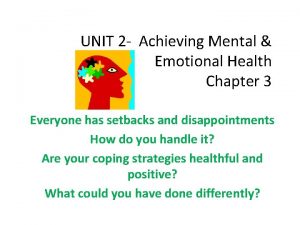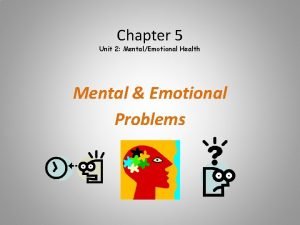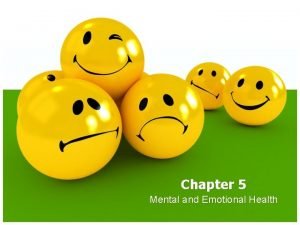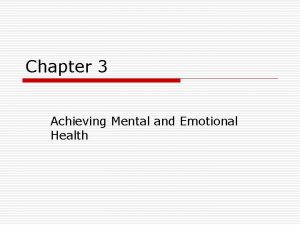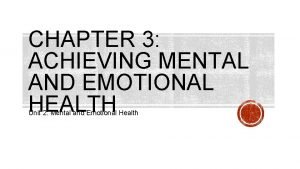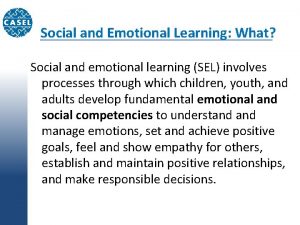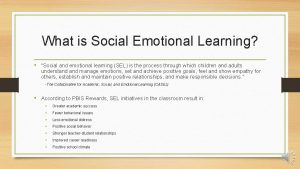Approaches to develop emotional mental and social factors

















- Slides: 17

Approaches to develop emotional, mental and social factors

Approach to develop Emotional Factor • Emotional Factor – anger • Approach - self talk • Self talk is used to improve the ability to control and challenge aggression in a positive way. It also reduces your frustration levels or increases your frustration tolerance • 3 Rs – recognise regroup refocus

• Recognise the common triggers that leads to loss of control and aggressive acts eg playing against certain people or teams can affect your performance in a negative way eg local derby fixtures • When this happens the player should apply strategies such as repeating key words or phases to counteract negative behaviour

• Regroup – able to stop and think about the possible consequences of reacting or losing control or showing aggression eg a time out in basketball half time in football • Having time to think may allow the player to calm down and engage in self talk

• Refocus – concentrate on the bigger picture or more important issues in the game. This is important both for the individual and how the team functions. This should lead to a more productive and positive outcome

• By refocusing players are able prepare thoroughly by imaging all different scenarios • Example – receiving a bad pass or a bad tackle is made and rather than looking to blame some one you should regroup by stopping and thinking and aiming to remain positive. Refocus by supporting the team and looking for solutions


• Factor – anxiety • Approach – mental rehearsal • ‘Mental rehearsal creates an image in the mind. You feel yourself performing the skill successfully’ • Boosts confidence by rehearsing previous good performances ie reducing negative thoughts

• Mental rehearsal controls the athlete’s response by mentally practising relevant cues and importantly eliminates all distractions before the competition • It helps you control your breathing and eliminates muscular tension • Mental rehearsal motivates the athlete by recalling images of scoring a goal or beating a competitor

• Mental rehearsal sets the scene with a complete mental picture of their performance - the athlete is then totally focused on the task and has no time for anxious thoughts or negative self talk before the event starts

• Mental rehearsal • Helps to refine skills • Motivates the athlete by recalling images of their goal for that session • Refocuses the athlete when the need occurs eg sluggish / poor form – imagery of previous success

• Mental imagery • Sets the stage for performance - a complete mental run through of the key elements of their performance. This should form part of the athlete’s pre competition routine • Mental rehearsal should not focus on the outcome but on the actions to achieve the outcome

Mental rehearsal • Mental rehearsal should be used every day at training and after training • ‘You only achieve what you believe’

Approach to Develop Social factor • Social Factor – Team Dynamics • Approach for development – Team Building Practices • Team building exercises help to build team morale where team mates learn to rely on each other. • It develops peoples’ strengths as well as addresses weaknesses

• Team building should be enjoyable and often takes place away from the working environment eg golf course or an assault course • The exercises aim to get the team interacting with each other. Quality time together as a team. • Tasks are set up specifically to develop team skills - players learn to become more effective and achieve success whilst at the same time have fun

• Team building exercises aim to improve teamwork, communication skills, leadership qualities, motivation and playing as a team. • Players have to buy into the concept of team building exercises otherwise in the heat of the game players may go back to their old ways of arguing withy each other and refusing to cooperate • Can you think of some team building tasks

 Approaches to develop emotional factors
Approaches to develop emotional factors Approaches to develop emotional factors
Approaches to develop emotional factors Disadvantages of mental rehearsal in sport
Disadvantages of mental rehearsal in sport Mental factors in pe
Mental factors in pe Approaches to develop social factors
Approaches to develop social factors Approaches to develop physical factors
Approaches to develop physical factors Develop new approaches to public governance and engagement
Develop new approaches to public governance and engagement Chapter 3 achieving mental and emotional health answer key
Chapter 3 achieving mental and emotional health answer key Chapter 5 lesson 4 getting help
Chapter 5 lesson 4 getting help Chapter 5 lesson 4 getting help answer key
Chapter 5 lesson 4 getting help answer key Chapter 5 mental and emotional problems
Chapter 5 mental and emotional problems Chapter 3 achieving mental and emotional health
Chapter 3 achieving mental and emotional health Glencoe health chapter 3 lesson 1 answers
Glencoe health chapter 3 lesson 1 answers Withdrawal glencoe
Withdrawal glencoe Chapter 15 achieving mental and emotional health answer key
Chapter 15 achieving mental and emotional health answer key Chapter 3 achieving mental and emotional health
Chapter 3 achieving mental and emotional health Glencoe health chapter 5
Glencoe health chapter 5 Chapter 9 mental and emotional problems
Chapter 9 mental and emotional problems

